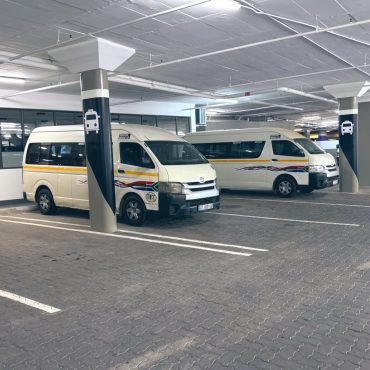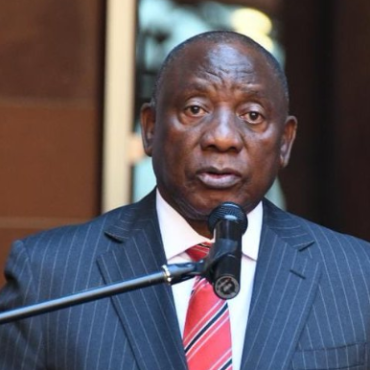-
play_arrow
On The Street On The Air | Kaya 959
Book extract: How Thabo Bester murdered Nomfundo Tyhulu
By Marecia Damons and Daniel Steyn
Here is an extract from The Thabo Story: The Facebook Rapist, the Celebrity Doctor and the Escape from Cell 35, by GroundUp reporters Marecia Damons and Daniel Steyn. The book goes on sale on Wednesday 11 October.
Nomfundo Tyhulu’s relationship with Bester started with a lie and ended in her murder. The little that is known about what happened between them is from court testimony, and even then it is mostly based on Bester’s account, parts of which may have been fabricated.
Tyhulu sold cars at the BMW dealership in Sandton that Bester visited in early 2011 to buy a new BMW 1 Series. She was 26 years old. Bester probably didn’t use his own name, but he did tell her he was working on a television production and that she would be a good fit to star in the show. Of course, he did not mention that he had just come out of prison for fraud.
At the time, he was living in Durban while she stayed in Johannesburg. Despite the nearly 600km between them, the two regularly kept in touch via phone calls and text messages. In early September 2011, eight months after they met, Tyhulu called Bester to let him know that she had a new job starting in October. Bester decided to take her to Cape Town before then, with the promise of using her in a photo shoot. The couple flew to Cape Town on 19 September and booked into the One&Only, a five-star hotel where a room costs between R13 000 and R36 000 a night. They stayed there for two nights.
On the 21st, the couple checked in at the Roman Retreat on the chic Sunset Beach estate. That evening, they had a heated argument about Bester seeing one of his former girlfriends. Tyhulu thought she and Bester were ‘exclusive’, but Bester was still playing the field. After the argument, they went to sleep.
At 2am, she woke to find Bester pointing a knife at her and telling her to give him her phone and laptop. He then raised the knife and lunged at her where she lay in bed. Tyhulu kicked and struggled against him, trying to pry the knife from his hand. They wrestled. Suddenly, the tussle stopped. She was now face down with the knife in her chest and blood seeping into the bedding.
Bester tied her hands behind her back with a T-shirt. He demanded the password to her laptop. Five hours later, at 7am, he left the room carrying a bag containing Tyhulu’s laptop and cell phone. He told the owner of the guest house that she was still sleeping and should not be disturbed until 2pm. He asked for a lift to central Cape Town and, that evening, boarded a flight back to Durban.
At about 9pm, the owners of the guesthouse became concerned that they had not heard from Tyhulu. They entered the room and discovered her lifeless and bloodied body.
By September 2011, the KwaZulu-Natal police unit for psychologically motivated crimes was trying to track down Bester.
He was now wanted for murder, rape, robbery and assault. It had become public knowledge that he was using different aliases in a variety of scams, usually targeting women in the media industry.
Up to 13 aliases were identified. Bester was also a suspect in a string of petty crimes in multiple cities and was believed to have more than 100 different cell phone numbers, making it difficult to find him. The news media started reporting regularly about the police search for the man now dubbed the ‘Facebook rapist’. The police were getting daily tip-offs and complaints from people across the country who had encountered Bester or been scammed by him. New Facebook accounts for Bester popped up under different names. It was impossible to track his location.
At one point, Bester posted on one of his Facebook pages: ‘Catch me if you can … why are people bothering me?’
But caught he was. On 6 October 2011, police in the Alberton area on the East Rand arrested him at last. He had hijacked a car and crashed it, after which the investigating officer on the case went to fetch him and take him back to Durban. A witness to the police operations described Bester as ‘incredibly neat, well-groomed, well-spoken and well-dressed’.
The following week, he appeared in the Durban Regional Court on two counts of rape and two counts of robbery. He pleaded guilty to all four charges. The 25-year-old told the court that he had three children. The whereabouts and identities of these supposed children are unknown.
Bester said that he had only intended to rob the rape victims. He detailed how the first victim, who had responded to the FHM advert, was having a shower at their hotel while he bought a knife and duct tape in the nearby mall. When he returned, he threatened her with the knife and tied her up with the tape.
‘As I was exiting, I saw the complainant’s legs and I was tempted sexually. My initial intention was to rob the complainant and I had accomplished this. After I saw the complainant’s body, I was impelled by lust and I then proceeded to rape her,’ he told the court.
He had also planned to rob his second victim, who he said had been introduced to him by his girlfriend. The identity of this supposed girlfriend remains unknown.
‘The complainant and I went to a guesthouse in Westville and we went to the Pavilion that evening for supper, by which time we were fancying each other and began kissing. We slept together that night.’
He held her at knifepoint, raped her and fled with her cell phone, watch and credit cards. Begging the court for a reduced sentence, Bester claimed that he had been driven to crime by his circumstances. He said he had never met his biological mother and that he had lived in poverty with his alcoholic grandmother.
‘I resorted to crime to support myself. It is either you die or [you] make a plan.’
He also claimed to be the victim of sexual violence. ‘My grandmother’s friend hurt me when he raped me and I had an operation on my behind.’
He said that he had been gang-raped in prison and a bottle of soapy water had been inserted into his anus. He showed evidence to the court that he had been abused in prison, but the document made no mention of rape. He also said that after his grandmother died, he had to live with his friends in a squatter camp, which was when he was raped again – this time by a man who had promised to look after him but locked him in his house for days. He burst into tears several times during the court hearing.
‘I know I have done terrible things. This is not truly who I am. I want the opportunity to make things right.’
Magistrate Sharon Marks sentenced him to 25 years’ imprisonment for each of the two counts of rape. He was sentenced to another 25 years, with five years suspended, for each of the two counts of armed robbery with aggravating circumstances. He later successfully appealed against the sentence in the Pietermaritzburg High Court, and it was reduced to a total of 30 years.
In August 2012, in the Western Cape High Court, Bester confessed to murdering Nomfundo Tyhulu. In an attempt to get a lesser sentence, he told the court: ‘I am fully responsible for what I have done. I did not fully understand what I was doing in Cape Town. I have known Nomfundo for four years and I have known her family. I can’t believe that I am responsible for killing her. She believed in me. She supported me when I was accused of rapes in Durban. She came down to support me. She was a friend. I am sorry for what happened.’
But his testimony did not sway the court. He received another life sentence plus 25 years for robbery with aggravating circumstances. In her judgment, Judge Judy Cloete said, ‘The fact of the matter is that, in your own version, this was nothing other than a sequence of brutal and callous acts which deprived this young woman of her life. It also deprived her loved ones of her presence in their lives. In these circumstances, the community at large will rightly expect this court’s sentence to reflect the seriousness with which crimes of this nature are regarded. No lesser sentence would be appropriate.’
Because he had pleaded guilty to his crimes, Bester never faced a full trial and the stories of his victims went untold.
Read Next: Ramaphosa calls for opening of humanitarian corridors in Israel-Palestine conflict
We value your feedback:
Written by: Dohne
Similar posts
MORE ARTICLES

Maps Maponyane introduces the newest member of his family

Eric ten Hag uncertain over future despite historic win over rivals Man City

Inside the multifaceted life of Kaya 959’s Tsikwe Molobye

The Lotto Results for Saturday, 25 May 2024

“Love her to bits,” Harriet Manamela praises Hellen Bright for her humility
QUICK LINKS
UpComing Shows

The Best T in the City
With T Bose
He has held it down in the world of mid-morning radio with the best music, riveting topics, brilliant mixes and interesting guests. Every weekday, The Best T proves why he is the BEST by connecting to you like only your bro or favourite uncle could. He lets his listeners dictate the songs they want to hear in the ever-popular Top 10 at 10, and his Three Teaspoons never run out. Catch The Best T in the City Mondays to Fridays from 09h00 to 12h00.
close
Feel Good
With Andy Maqondwana
Feel good about feeling good! That's exactly what The Feel-Good show is about. An escape from the negativity that surrounds us, indulging you in good feels. Pass it on to one and all. Spread the good feeling around Gauteng with Andy Maqondwana.
close
Kaya Biz
With Gugulethu Mfuphi
The world of business is simplified for you by Kaya Biz with Gugulethu Mfuphi. This fast-paced award-winning business show talks to the corporate giants as well as up and coming entrepreneurs about their wins and challenges. Gugulethu invites guests to offer their analyses of markets and economies, and also delves into issues of personal financial wellness. Kaya Biz airs Mondays to Thursdays 18h00 to 19h00.
close
Point of View
With Phemelo Motene
Point of View with Phemelo Motene delves into the day’s current affairs, touches on real issues that affect people’s daily lives and shares expert advice on questions posed by the audience. Mondays to Thursdays 20:00 to 22:00.
close
959 Music Weekdays
Kaya 959 Hits
Real. Familiar. Memorable. Kaya 959 brings you the music you know and love from our playlist. Uninterrupted. Thursdays 20h00 to 21h00
closeConnect with Kaya 959
DownLoad Our Mobile App
© 2024 Kaya 959 | On The Street On The Air











